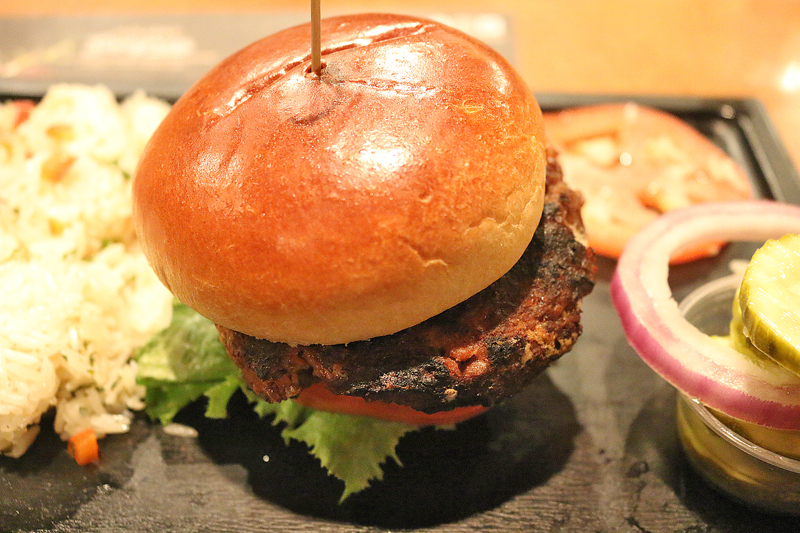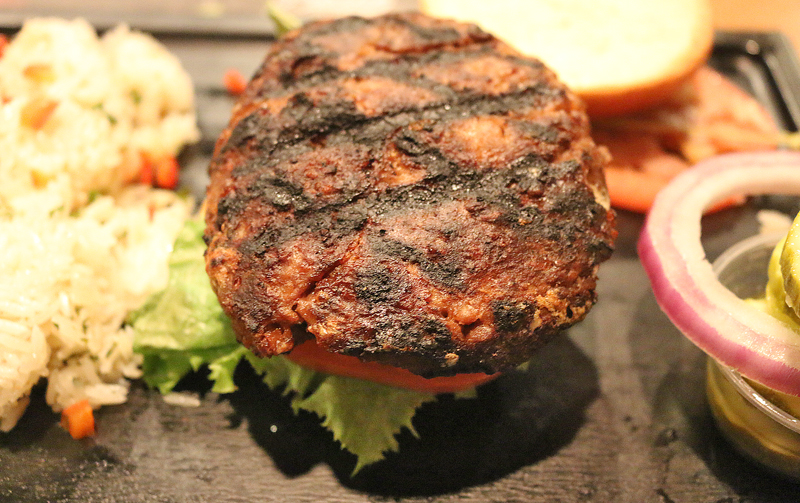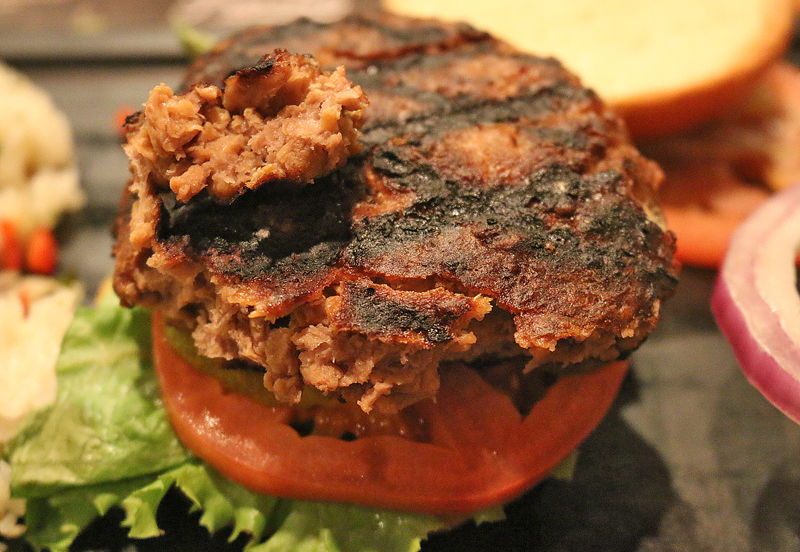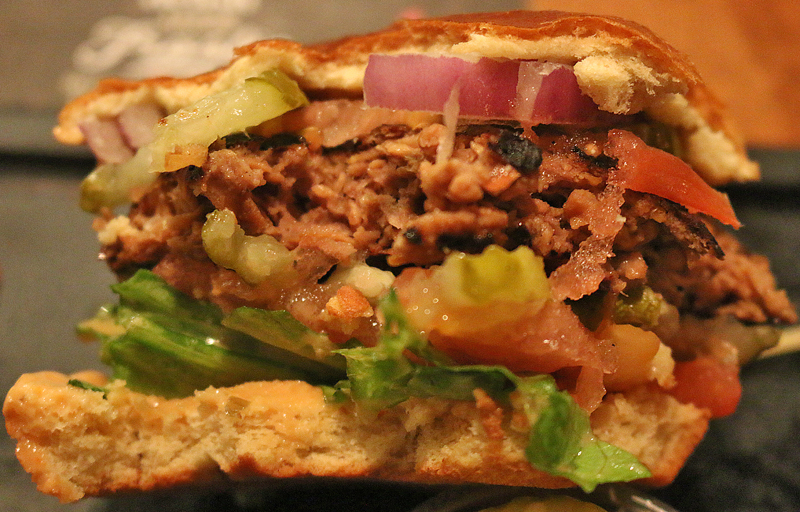Both Impossible Foods and Beyond Meat have been developing alternatives to meat — such as beef — using plants and other ingredients to emulate the texture, taste and overall experience to real meat as closely as possible…
Review: Beyond Meat Burger by TGI Fridays

…but could substituting meat with alternative foods whose ingredients are derived from plants help not only satiate the great hunger for beef which Americans have had for centuries — to the point where it has been ingrained in the culture in the United States — but also repair and reverse what has been called the great nutrition collapse?
Consider the Where’s the Beef? advertising campaign from Wendy’s back in 1984 and the repeated vexatious chant from 1981 known as T Bone by Neil Young, which is nine minutes and 14 seconds about how our Canadian protagonist has mashed potatoes but none of that satisfying meaty goodness attached to the bone.
Providers of food — such as restaurants and supermarkets — have been seeking to offer alternatives to beef chiefly due to the increase in prices, which have been fueled by simultaneously record increased demand with decreased production. As one example, increases in beef prices have been cited as part of the reason for the decline of Kosher delicatessens over the years.
Furthermore, the production of beef is increasingly harmful to the environment overall. “Ninetieth-percentile GHG emissions of beef are 105kg of CO2eq per 100g of protein, and land use (area multiplied by years occupied) is 370 m2∙year”, according to this study from 2018 by Joseph Poore and Thomas Nemecek as accepted by the American Association for the Advancement of Science. “These values are 12 and 50 times greater than 10th-percentile dairy beef impacts (which we report separately given that its production is tied to milk demand). Tenth-percentile GHG emissions and land use of dairy beef are then 36 and 6 times greater than those of peas. High variation within and between protein-rich products is also manifest in acidification, eutrophication, and water use.”
To offset the negative aspects of beef production and consumption, alternatives have been provided for traditional beef — and, to devoted meat eaters, have mostly failed. Alternatives to beef with ingredients based from plants are consumed mostly by those who follow a vegetarian or vegan diet; but most beef eaters remain skeptical…
…which is one of the reasons why I not only tested the taste and texture of the Impossible Whopper sandwich from Burger King; but also that of the Beyond Meat hamburger offered by TGI Fridays.
The Beyond Meat Burger Taste Test
I have found the hamburgers offered by TGI Fridays to be hit or miss. Sometimes they are very good. Other times, they can contribute to an unpleasant experience. As with the Whopper sandwich from Burger King, I sometimes encountered an inordinate amount of gristle which impeded upon any enjoyment I might have had out of eating an otherwise insipid hamburger. I do not like fighting with my food; and having to pick gristle out of my mouth every couple of minutes is not exactly appetizing.

My curiosity was piqued recently when I was at a location of TGI Fridays for dinner. I decided to purchase the Beyond Meat Cheeseburger and ordered it without cheese, as technically a Beyond Meat Burger does not exist on the menu at TGI Fridays. I also asked for extra pickles.

At first glance after removing the top brioche bun, the Beyond Meat burger resembles a regular hamburger — complete with charred grill marks…

…but that is where the comparison to a real beef hamburger ended for me. I then tore a piece of the patty which had no condiments on it and ate it plain. Although I did like the “crust” of the patty, the texture — and, to a point, the taste — seemed “loose”, like the hamburger was cooked to a very rare temperature at best; and not convincingly similar to that of a real beef hamburger patty. The difference between a Beyond Meat patty and a real beef hamburger patty were obvious to me, in my opinion. I prefer my hamburgers to be well done, which is how I ordered this one — but somehow I did not believe that simply having it cooked more would have done much to save it.

Interestingly, the other ingredients were quite good: the tomato was closer to peak ripeness than that of a Whopper sandwich from Burger King; and the lettuce was surprisingly fresh, green and crispy. The pickles and onion were satisfyingly crunchy. Even the brioche bun itself was of a good quality.
Overall, I was not convinced that it completely tasted like real beef. Nonetheless, I would not relish dining on plain Beyond Meat hamburger patties anytime soon.
However — upon biting into the sandwich with all of the condiments and the bun — the Beyond Meat Burger at best only somewhat resembled that of the original beef version offered by TGI Fridays.
What I liked most about the Beyond Meat Burger is that I did not encounter any gristle — but the texture of the patty itself was unfortunately not pleasant enough to give no gristle enough of an advantage.
Alternatives to Beef Hamburgers?
When I assisted in the clean-up efforts after Hurricane Katrina devastated the Mississippi Gulf Coast back in 2005, we either ate MREs — ready-to-eat meals which members of the military eat when on a mission — at night, or we cooked on an outdoor grill illuminated either by a fire or an electric light powered by a battery. One night, we had hamburgers — but there was no ground beef to be found; so we had a choice of ground turkey hamburgers or vegetarian hamburgers. I had one of each. They could not compare to beef hamburgers; but on their own, they were not bad.
I would have no problem eating a hamburger comprised from vegetables and plants — as long as it was dressed with plenty of condiments and was accompanied with a bun of very good quality; and as long as I do not compare it to a real beef hamburger. A vegetarian hamburger is a completely different type of food to me than a beef hamburger; and comparing them would be like comparing a fish sandwich to a chicken sandwich with the same condiments. Similarly — my being originally from Brooklyn as a “pizza snob” — I can eat certain types of pizza as long as I do not compare them to the ones one can enjoy in New York.
Nutritional Information and Comparison
If you are thinking that the Beyond Meat Cheeseburger at TGI Fridays is a healthier alternative to its original Cheese Burger, think again. The following information was extracted straight from this official document of TGI Fridays.
To be fair, the comparison shown above includes all of the ingredients of a Cheese Burger; but the differences between the two cheeseburgers reflect the patties themselves — and the Beyond Meat Cheeseburger includes a condiment called Fridays sauce, which will affect the comparison. I was not able to get data which did not include Fridays sauce on the Beyond Meat Cheeseburger.
Compared to the original Cheese Burger, the Beyond Meat Cheeseburger has:
- 70 more calories
- Four more grams of fat
- The same amount of grams of saturated fat
- No trans fat at all as compared to 2 grams of trans fat for the original Cheese Burger
- 105 fewer milligrams of cholesterol
- 590 more milligrams of sodium
- Nine more grams of carbohydrates
- Four more grams of fiber
- The same amount of grams of sugar
- Five more grams of protein
Vegetarian Diet Advantages and Disadvantages
“Multiple studies have linked vegetarian diets to a reduced incidence of chronic disease and cancer. Excluding meat or animal products makes a diet healthier, but there are other factors to consider”, according to this article written by Liza Torborg for the Mayo Clinic…
…but “there still aren’t enough data to say exactly how a vegetarian diet influences long-term health”, according to this article published from Harvard Medical School. “It’s difficult to tease out the influence of vegetarianism from other practices that vegetarians are more likely to follow, such as not smoking, not drinking excessively, and getting adequate exercise.”
Regardless, both articles cite that some evidence exists that vegetarians have a lower risk for cardiac events — such as a heart attack — and death from cardiac causes; that eating lots of fruits and vegetables can reduce the risk of developing certain cancers even though the evidence that vegetarians have a lower incidence of cancer than non-vegetarians do is minimal; and that a predominantly plant-based diet can reduce the risk for type 2 diabetes.
This abstract from the United States National Library of Medicine of the National Institutes of Health suggests that hypogonadism — which is a condition in which the body does not produce enough testosterone — and erectile dysfunction are associated with soy product consumption.
Summary

Interestingly, the Beyond Meat Cheeseburger is arguable even less healthy than an Impossible Whopper sandwich from Burger King when judging by the nutritional information of both products.
The Beyond Meat Cheeseburger at TGI Fridays cost $13.49 plus tax as compared to the cost of the original Cheese Burger, which is $9.99 plus tax. At first glance, the difference of $3.50 is not an unreasonable premium for the Beyond Meat Cheeseburger…
…but the Beyond Meat Cheeseburger is questionably a reasonable alternative to the original Cheese Burger when eaten together with all of the included condiments and ingredients if you simply do not want to consume meat for whatever reason.
I personally do not see myself ordering it anytime soon in the foreseeable future…
All photographs ©2019 by Brian Cohen.
